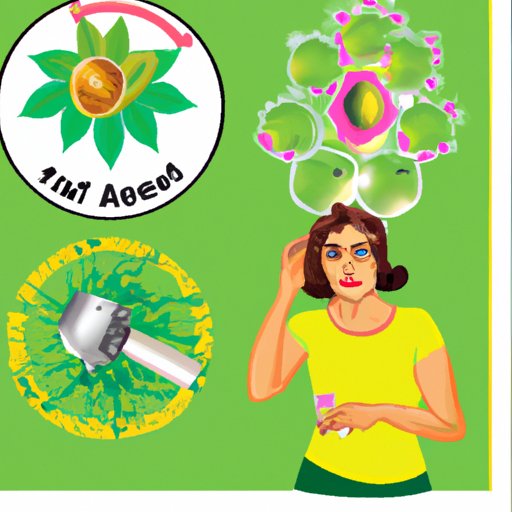Introduction
Hot flashes are sudden periods of intense heat that can occur at any time. They are often associated with menopause, but they can affect people of all ages and genders. Hot flashes can cause sweating, flushing, rapid heartbeat, chills, and a feeling of anxiety. They can last from a few seconds to several minutes and may occur multiple times throughout the day and night.
The purpose of this article is to provide tips and strategies to help stop hot flashes fast. We’ll explore diet modifications, cooling techniques, exercise, herbal remedies, medications, stress reduction techniques, and more.
Diet Modification
What we eat and drink can greatly affect our hot flashes. Certain foods and beverages can trigger hot flashes, so it’s essential to know which ones to avoid. Some common triggers include alcohol, caffeine, spicy foods, and sugary desserts. Instead, try to incorporate more plant-based foods into your diet. Fruits, vegetables, whole grains, and lean proteins can help reduce hot flashes.
You can also try adding more foods rich in phytoestrogens, such as soy, flaxseeds, and lentils. These plant-based compounds may help balance hormones and reduce hot flashes.
Cooling Techniques
When a hot flash strikes, it’s essential to cool down quickly. Various techniques can help reduce body temperature and alleviate symptoms. One of the easiest ways to cool down is to run cold water over your wrists or splash your face with cold water. You can also place a cool cloth on the back of your neck, or sit in front of a fan. It’s helpful to wear lightweight, breathable clothing, especially during the warmer months.
If you’re at home, consider taking a cold shower or bath. This can help lower your body temperature and provide relief from hot flashes. You can also try using a cooling pad or pillow at night to stay comfortable while sleeping.
Exercise
Regular exercise has been shown to help reduce hot flashes. Exercise can help regulate hormones, promote better sleep, and reduce stress levels. It’s essential to choose exercises that you enjoy and can maintain over time. Some moderate exercises include walking, yoga, swimming, and cycling. Aim for at least 30 minutes of exercise per day, most days of the week. You don’t have to exercise in one long session. You can break it up throughout the day into smaller intervals if needed.
Herbal Remedies
There are various herbal remedies that may help reduce hot flashes. Black cohosh, evening primrose oil, and red clover are some of the most commonly used. These remedies contain plant-based compounds that may help balance hormones and reduce hot flashes. However, it’s essential to talk to your healthcare provider before trying any new herbal remedies. Some remedies can interact with medications or may not be safe for people with specific health conditions.
Medications
If hot flashes are severe or interfering with your quality of life, your healthcare provider may recommend medication. Hormone therapy is a common treatment used to help reduce hot flashes. It involves taking estrogen or a combination of estrogen and progesterone. However, hormone therapy is not for everyone and may increase the risk of certain health conditions. Your healthcare provider will discuss the benefits and risks of hormone therapy before prescribing it.
Another medication used to reduce hot flashes is Selective Serotonin Reuptake Inhibitors (SSRIs). These medications are typically used to treat depression and anxiety, but they can also help reduce hot flashes. Other medications, such as Gabapentin, have also been used to treat hot flashes, but they may have side effects and are typically used as a last resort.
Stress Reduction Techniques
Stress and anxiety can worsen hot flashes. Therefore, it’s essential to incorporate stress-reducing techniques into your daily routine. Deep breathing exercises, meditation, and mindfulness can help reduce stress levels. You can also try yoga or tai chi classes, which combine exercise and relaxation techniques. Creating a relaxing environment at home, such as listening to calming music or taking a warm bath, can also help alleviate stress.
Conclusion
Hot flashes can be challenging to manage, but there are strategies and tips you can try to stop them fast. By modifying your diet, utilizing cooling techniques, exercising regularly, trying herbal remedies, taking medication if needed, and reducing stress levels, you can reduce the frequency and intensity of hot flashes. It’s essential to remember that what works for one person may not work for another, so don’t be afraid to try different methods and consult with your healthcare provider before taking any new remedies or medications.
